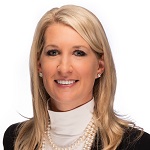1. Demonstrate Conviction
In times of uncertainty, clients aren’t just looking for information, they’re looking for someone who understands their concerns and can help them make sense of what’s happening. If you appear unsettled or hesitant, clients are likely to feel uneasy. That’s why demonstrating conviction is essential. This doesn’t mean having all the answers—it means showing up with a well-informed point of view about the markets, the economy, and what may lie ahead. Use resources from your firm and external partners to gather facts, craft a compelling narrative, and communicate it clearly.
Example: During the early days of the COVID-19 pandemic, one experienced financial professional told concerned clients, “We’re in uncharted territory, but we’ve designed your portfolio to withstand a range of market scenarios. While this is unprecedented, let’s stay the course and revisit your plan together.”
That message acknowledged uncertainty, validated client concerns, and reinforced the financial professional’s commitment to guiding them through it. Your composure can be the anchor that keeps them grounded. That calm, steady approach helped clients avoid panic selling and stay focused on the future.
2. Make Your Clients’ Financial Plan the Cornerstone of the Conversation
When clients feel the urge to make impulsive decisions, like moving to cash during periods of volatility, bring them back to the plan. Revisit the built-in contingencies and remind them why those choices were made, such as accounting for market corrections and short-term fluctuations without requiring major lifestyle or portfolio changes.
Example: One experienced financial professional recalled a client who panicked during a downturn and wanted to sell their equity holdings. Instead of reacting, the financial professional pointed to the plan, which had already factored in a 20% market decline. Together, they reviewed the long-term projections and confirmed that the client’s retirement goals were still on track. That perspective helped shift the client’s mindset.
The financial plan isn’t static. It’s a dynamic tool that helps clients make sound decisions, especially when emotions run high. When markets are turbulent or headlines unsettling, use the plan to assess the real impact of potential actions, refocus on long-term goals, and make thoughtful adjustments if needed. Grounding conversations in strategy rather than emotion helps clients stay the course—and that steady, thoughtful guidance is what builds lasting trust.
3. Lean on Your Support System
Clients rely on you for trusted guidance—but who do you rely on when the pressure mounts? Whether it’s a mentor, colleague, coach, or consultant, having a support system can help you process challenges, gain perspective, and grow both personally and professionally.
Example: A new financial professional shared that, during her first year, she regularly met with a mentor who had extensive industry experience. These conversations helped her process client challenges, gain perspective, and build self-assurance. She credits those check-ins with helping her stay grounded and avoid burnout—especially during periods of market stress.
Building a career in financial services doesn’t mean going it alone. Seeking support from experienced peers or mentors can help you stay grounded, avoid burnout, and continue developing the skills and fortitude needed to serve your clients well. Just as your clients benefit from your guidance, you benefit from having someone in your corner too.
4. Take Care of Yourself
Early in your career, it’s easy to feel like you must prove yourself by working nonstop. But working yourself to exhaustion won’t improve your clients’ outcomes—and it can quickly lead to burnout. Sleep, exercise, hydration, and setting boundaries to protect personal time becomes even more important during stressful periods. Even taking 15 minutes for a walk around the block to get some fresh air can make a significant difference.
Example: One financial professional shared that during a particularly volatile quarter, she found herself constantly checking market updates and client emails late into the night. Realizing the toll it was taking, she committed to a new routine: no screens after 8 p.m., a morning walk before work, and scheduled time each week to connect with a mentor. She noticed that not only did her stress levels drop, but her conversations with clients became more focused and empathetic.
Taking care of yourself isn’t a luxury, it’s essential to being an effective financial professional. By maintaining your well-being and leaning on trusted peers or mentors when needed, you’re better equipped to stay focused, empathetic, and grounded for your clients. That kind of presence builds trust—and helps you thrive in the long run.






